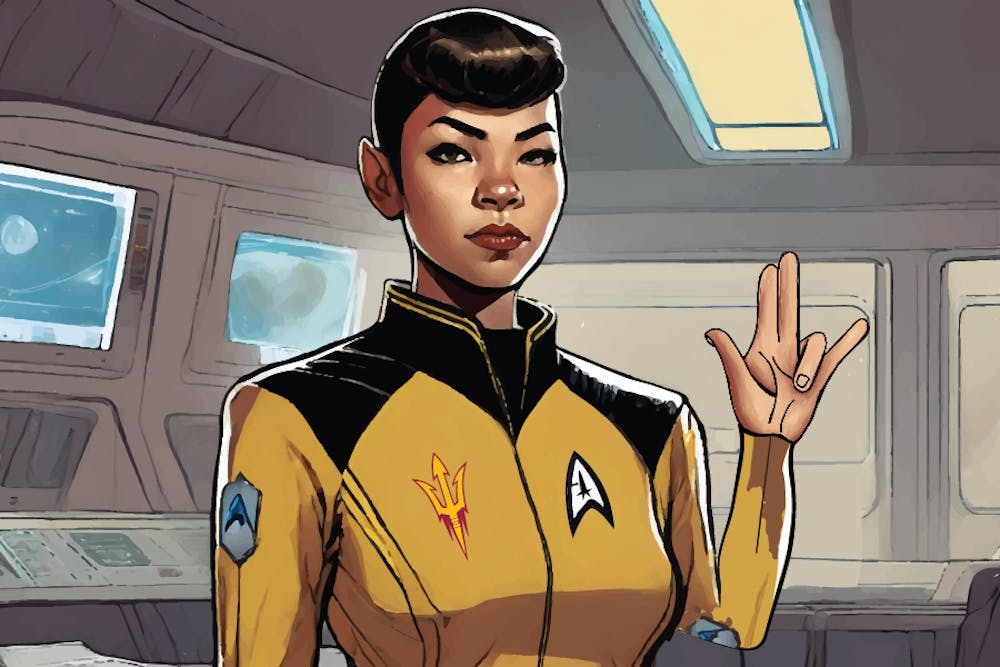Students of all disciplines are invited to materialize the futuristic ideas and technologies of Star Trek through a series of courses offered at ASU.
The pioneering class, titled Star Trek and Humanity's Future in Space, merges the realms of science fiction and academic inquiry, aiming to prepare students for the complexities of living and working beyond Earth. This course draws inspiration from the iconic Star Trek franchise to explore potential future scenarios humanity may face in the cosmos.
David Williams is a research professor at ASU's School Of Earth and Space Exploration, a member of the NASA Psyche mission science team and the instructor of the Star Trek and Humanity's Future in Space courses.
The inception of the class was a collaborative effort between Williams and Lindy Elkins-Tanton, the principal investigator of the Psyche mission and a Foundation and Regents Professor at SESE. She approached Williams regarding inquiry classes, which are required topic-focused courses for students in the Interplanetary Initiative, but students of other disciplines can take them as well.
"I suggested to her that Star Trek ... might be a good mechanism to help investigate these problems related to humanity's future in space," Williams said. "She said, 'Yeah, that's an excellent idea'."
This marked the beginning of an innovative educational journey, blending science fiction's speculative narratives with real-world scientific inquiry to address the future challenges of space exploration.
The courses, while held in the same room and at the same time, have different names: IPI 296, IPI 496, SES 294 and SES 598. This diversity in course naming reflects the curriculum's interdisciplinary nature, aiming to engage students from various fields in a unified exploration of space's future obstacles.
"The concept of the inquiry courses is that they can be adapted to investigate a wide variety of questions related to humanity's future in space," Williams said. "My Star Trek class is just one example of that."
Lana Tilke is a first-year graduate student at SESE, studying astrophysics. She is also a TA for the Star Trek and Humanity's Future in Space sections.
"It's not just like a class where you go through Star Trek lore, and you get quizzed on episodes and stuff," Tilke said. "Students determine a topic that will be something that humans have to interact with as we move from an Earth-based civilization to a space-based civilization."
To highlight the topics chosen by the students, Star Trek episodes are chosen by Williams and Tilke to assign as coursework. From these episodes, students are tasked with identifying natural next questions, leading them to explore relevant, peer-reviewed scientific literature.
"Different (topics) have to do with qualities such as artificial gravity, technology or social topics, such as how would disability in the workplace play a role on a space station or a space colony," Tilke said.
This innovative approach leverages the speculative fiction of Star Trek to frame and examine real-world scientific and technological challenges, encouraging students to envision practical applications within humanity's spacefaring future.
"(They) bring together all of the ideas that they found and do a presentation to the class," Tilke said.
This methodical bridging of science fiction with reality enhances students' capacity to envision and shape the future, embodying the spirit of exploration and innovation that Star Trek itself champions.
Williams is a lifelong fan of Star Trek who began watching the series since it first aired in 1966.
"I watched those same 79 episodes over and over again. That show has a very optimistic vision of the future. In the future of Star Trek, Earth is the leader of a federation of different alien species," Williams said. "Everybody works together, it's democratic, it's very pluralistic, there is no crime, there is no war."
While conflicts still threaten the characters, Star Trek represents an ideal, cooperative approach to solutions, according to Williams.
"Throughout my entire life ... that has sort of been additional inspiration for me to ... lead an ethical life, but also this positive vision of the future," Williams said.
His story underscores the unique power of science fiction to inspire real-world applications and academic inquiries, shaping how we envision and work toward our future in the cosmos.
This lifelong engagement with Star Trek's themes profoundly influenced his decision to create the Star Trek and Humanity's Future in Space class and to offer the opportunity to a wide range of students.
"We have both undergraduate students and graduate students registered for the class, and graduate students from any department can register for the graduate level offering of this class," Tilke said.
This accessibility means that whether a student is just beginning their academic journey or they are delving deeper into their graduate field, this class offers an opportunity to explore the intersections of science fiction, science fact, and the potential futures of human space exploration.
ASU's Star Trek and Humanity's Future in Space class transcends the traditional boundaries of an academic course. The course embodies a pioneering approach towards envisioning outer space not just as an uncharted territory, but as a realm where humanity can flourish.
Edited by River Graziano, Alysa Horton and Caera Learmonth.
Correction: A previous version of the story stated that inquiry classes were required for SESE students. This has been corrected as of 11:24 a.m. on April 3, 2024.
Reach the reporter at dmanatou@asu.edu.
Like The State Press on Facebook and follow @statepress on X.
Dimitra is a junior studying biomedical engineering and physics. This is her second semester with The State Press. She has also worked as a research assistant in Kirian Lab.




